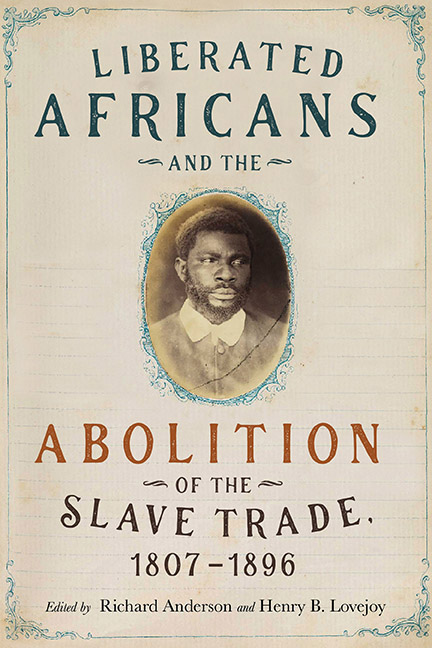Book contents
- Frontmatter
- Dedication
- Contents
- List of Illustrations
- Acknowledgments
- Introduction: “Liberated Africans” and Early International Courts of Humanitarian Effort
- Part One Origins of Liberated Africans
- Part Two Sierra Leone
- Part Three Caribbean
- Part Four Lusophone Atlantic
- Part Five Liberated Africans in Global Perspective
- Part Six Resettlements
- Bibliography
- Notes on Contributors
- Index
8 - Household Labor and Sexual Coercion: Reconstructing Women's Experience of African Recaptive Settlement
Published online by Cambridge University Press: 21 March 2020
- Frontmatter
- Dedication
- Contents
- List of Illustrations
- Acknowledgments
- Introduction: “Liberated Africans” and Early International Courts of Humanitarian Effort
- Part One Origins of Liberated Africans
- Part Two Sierra Leone
- Part Three Caribbean
- Part Four Lusophone Atlantic
- Part Five Liberated Africans in Global Perspective
- Part Six Resettlements
- Bibliography
- Notes on Contributors
- Index
Summary
Between 1807 and 1819, the British Royal Navy rescued over five thousand Africans from slave ships operating illegally in the Caribbean after the passage of the 1807 Abolition Act. These slave-ship cases were adjudicated at various vice-admiralty courts in British Caribbean colonies, and the Africans removed from such vessels were declared free and settled in those islands. The largest numbers of Africans emancipated in the Caribbean this way were settled in Antigua, the Bahamas, and Tortola in the British Virgin Islands. While these earliest liberated African arrivals formed less than 3 percent of the more than one hundred and fifty thousand rescued from Atlantic slave ships by the British navy, for a variety of reasons their early experience provides important insights into the much larger history of liberated Africans, especially in the Caribbean. Additionally, as free Africans who entered New World slave societies at the dawn of abolitionism, their lives also help to illuminate the evolving processes of emancipation as hereditary slavery for people of African descent gradually broke down across the Americas.
The liberated Africans from these early years of Caribbean slave-trade suppression mostly remained in the places in the British Caribbean where viceadmiralty courts had initially been called upon to adjudicate their slave-ship cases. In the present chapter I draw excerpted life stories from the earliest liberated African arrivals in Antigua and Tortola to specifically explore the gendered limits of post-slavery freedom as these Africans experienced it. Liberated African women and girls had sexual relationships, produced children, and formed households with men of diverse backgrounds under a variety of conditions. Those conditions included coercion, necessity, exigency, convenience, and also desire and consent. Liberated African women and girls also worked in significant numbers in domestic service. Their lives in household labor intersected with their wider familial, sexual, and social interactions in their new Caribbean homes. How do these particular liberated African experiences illuminate our understanding of the role of femininity within the institution of racialized chattel slavery and its many aftermaths?
Review of the robust and searchable compilations of Atlantic slave-trade data published over the past quarter century, most notably through the Voyages database, indicates that the British authorities seized at least thirty ships around the Caribbean between 1807 and 1819.
- Type
- Chapter
- Information
- Publisher: Boydell & BrewerPrint publication year: 2020



